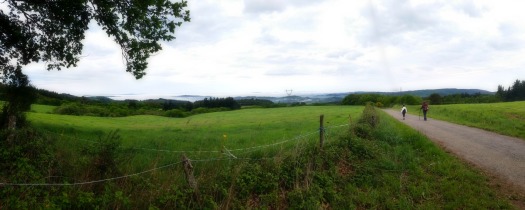 While walking along cow pastures and woody stands, I had not seen a soul for the past three hours. But I was accompanied by huge thunderclouds, hanging heavy with the rain that seemed destined to come. The low clouds refused to release, and I silently prayed for the showers that would dampen the oppressing heat and humidity that had been building all afternoon.
While walking along cow pastures and woody stands, I had not seen a soul for the past three hours. But I was accompanied by huge thunderclouds, hanging heavy with the rain that seemed destined to come. The low clouds refused to release, and I silently prayed for the showers that would dampen the oppressing heat and humidity that had been building all afternoon.
Combing the countryside on Camino Primitivo
I was walking the Camino Primitivo, an ancient pilgrimage path that connects Oviedo in Asturias to Santiago de Compostela in northern Spain. While trekking, I was also editing and updating a guide book for the route for a London publisher. I was not surprised how much the lists of restaurants and accommodations had changed since the last edition in 2011. With the growth of interest in walking the various Caminos that spider web through Europe, there was sure to be many changes and additions. But I was surprised by the amount of construction in the backwoods of northern Spain that was changing the actual route.
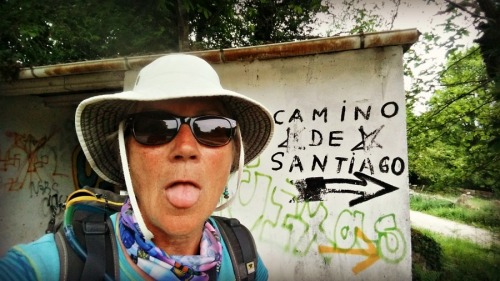 Course changes meant that I needed to document those route deviations in the guide book. I needed to stop, make notes and maybe retrace my steps to ensure accuracy. The frustrating search for San Salvador de Soutomerille, a small 9th C church, had me back-tracking through hot, farm fields. I finally decided that the ancient chapel must be on the alternative route that, although I was sure I had taken, I must not have followed. My 23-pound pack seemed twice as heavy as it did that morning when I left O Cadavo. I spent two extra hours and retraced three miles combing the remote countryside.
Course changes meant that I needed to document those route deviations in the guide book. I needed to stop, make notes and maybe retrace my steps to ensure accuracy. The frustrating search for San Salvador de Soutomerille, a small 9th C church, had me back-tracking through hot, farm fields. I finally decided that the ancient chapel must be on the alternative route that, although I was sure I had taken, I must not have followed. My 23-pound pack seemed twice as heavy as it did that morning when I left O Cadavo. I spent two extra hours and retraced three miles combing the remote countryside.
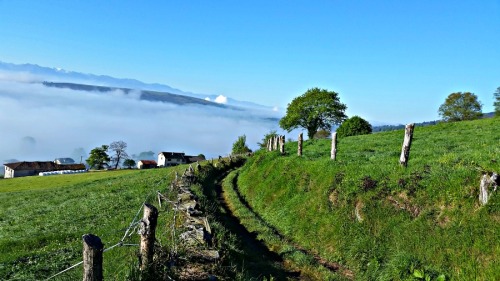 Alone in Northern Spain
Alone in Northern Spain
That was the reason that by 4 pm I was walking alone. My pilgrim friends would have checked into Albergue Casa da Chanca, the place where we’d agreed to rest for the night, hours ago. I still slugged along under the sweaty heat of the pregnant clouds. I was climbing towards Lugo, which lies on a hill surrounded by three rivers. As I climbed, I got nearer and nearer to the clouds that were turning black. My prayers were about to be answered.
I set my pack down under the sheltering arms of an oak, opened my pack and as I reached to put on my raincoat, the skies opened. Hunching down, I fit my rainfly around my backpack as the rain pelted down. I was getting hammered and as I stood up to survey my situation in the thunderstorm, I knew I’d have to stay in place under the tree on this lonely farm road for a while. I could see a barn at the intersection ahead of me, but it looked deserted and locked. I thought of my friends sheltering in the albergue. I was looking forward to reconnecting with them for dinner; this surely put a kibosh on that.
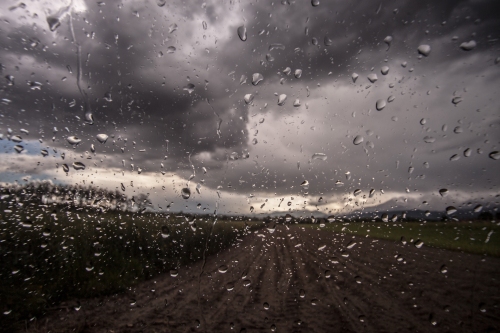 For some reason, I looked back up the tree-lined road where I’d just come. Maybe I heard something that caused me to look. But there, up the lane, were two Spanish people walking their dog. The country couple huddled under a big umbrella, which maybe seemed so large because they were so short of stature. The man held the umbrella in one hand and his wife’s shoulder in the other. As the rain pelted sideways from the wind, he pointed the umbrella towards the gusts and steered his wife to another oak on my side of the road. Their Golden Retriever crouched at their ankles.
For some reason, I looked back up the tree-lined road where I’d just come. Maybe I heard something that caused me to look. But there, up the lane, were two Spanish people walking their dog. The country couple huddled under a big umbrella, which maybe seemed so large because they were so short of stature. The man held the umbrella in one hand and his wife’s shoulder in the other. As the rain pelted sideways from the wind, he pointed the umbrella towards the gusts and steered his wife to another oak on my side of the road. Their Golden Retriever crouched at their ankles.
Appeared out of nowhere
After an afternoon without seeing anyone, they seemed like angels to me. They appeared out of nowhere, and I thought, “They’re old folks, walking their dog. Their home MUST be close by.” I waved a hand of welcome, and the woman waved back. We stood under our prospective trees for what seemed like 20 minutes. I had no idea how far I was from Lugo, but it was already after 5 pm, and I was giving up hope on meeting my fellow pilgrims for dinner. I felt sad that after such a frustrating day, I would miss the compassionate companionship of fellow walkers.
When the storm finally let up, the villagers began walking. I waited, and we trod through the light rain together. We only smiled and laughed since none of us had a handle on the other’s verbal language. After about a mile, and the third country intersection, the wife pointed to the right and said, “Camino.”
Through the twilight drizzle
I said, “No, yo voy a su casa. You quiero un taxi.” “No, I go to your house. I want a taxi.” They both smiled and motioned onward. And we kept walking and walking. So much for my theory that old people take short dog walks. Another twenty minutes, I could see a line of row houses through the twilight drizzle. We must be reaching the outskirts of Lugo. “Esta es la casa de mi amigo,” she smiled. “Llamará un taxi para ti.” “This is my friend’s house; she’ll call a taxi for you.”
“Muchas gracias,” I cried. The door opened, and the wife explained in rapid Spanish as I slid, dripping, into the entryway. I was happy to have the introduction because the friend spoke no English and I couldn’t understand her Spanish. She left me standing on the linoleum at the door to go upstairs to get her millennial son to call a cab.
Rescued by Camino Angels
She returned to ask me a question, which I couldn’t understand. After repeating it three times, she gave up and went back upstairs to retrieve a huge, thick cotton towel. Toalla! Towel! That’s the word I didn’t recognize. Then she asked me if I needed a shirt – I could understand the word camisa. No, the towel would do, I somehow explained. I felt bad about all the water on the floor that was dripping off of me, my raincoat and my pack. But I helped her mop it up. The kindly mother made her son come down to explain that the taxi would be here soon. His English was about as good as my Spanish.
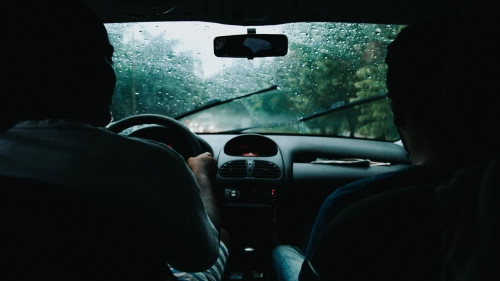
The taxi arrived and whisked me to Albergue Casa da Chanca. The ride was only five minutes long, and I realized how close I was to town when the thunderstorm had broken loose. Rodrigo and Ximena, my pilgrim family from Mexico, welcomed me warmly. They laughed at my stories of misfortune and Camino angels, and I had fifteen minutes to unpack and dry off before we went back out into the rain for a late dinner. There, over octopus and white wine, I repeated my story of the kindness of strangers to Lazlo and Peter, our Hungarian friends.
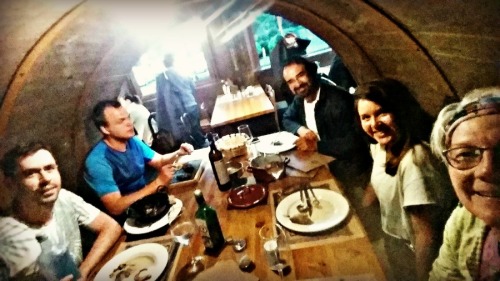
Stacey “Vagabonding Lulu” Wittig, an Arizona travel writer based in Flagstaff, has written three books about the Camino de Santiago. To learn more, go to Amazon at http://bit.ly/CaminoBook

Sounds like an incredible adventure!
LikeLike
Thanks, Tiffany, it was an incredible adventure. On April 25 I leave for my next Camino adventure: Bordeaux, France to Santiago, Spain.
LikeLike